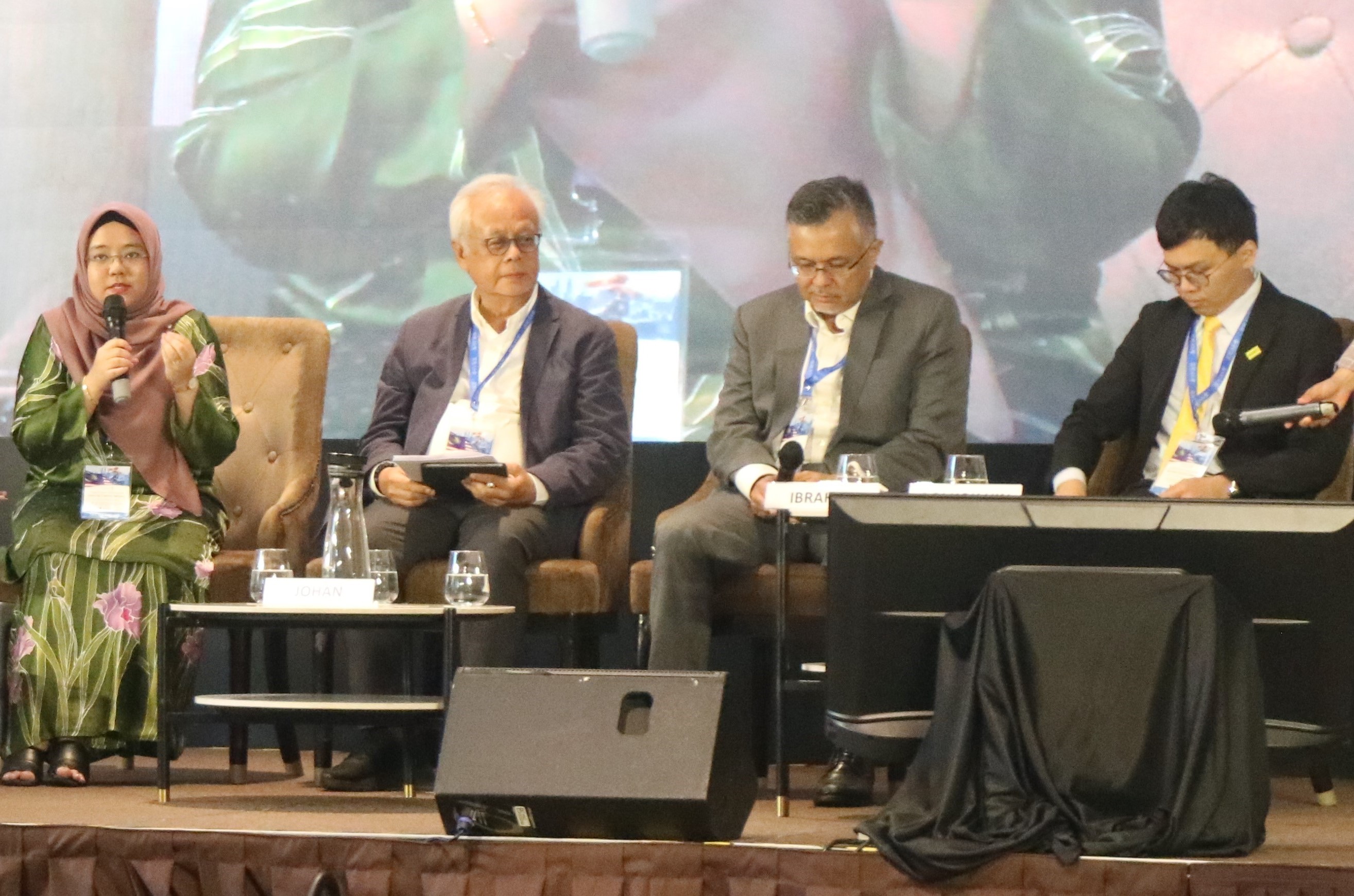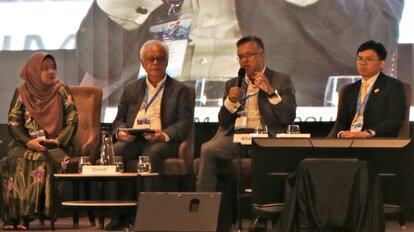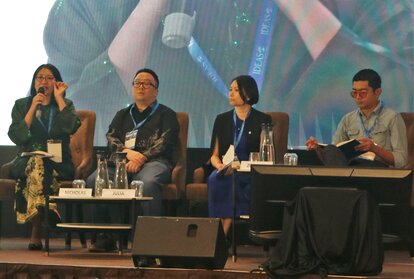Event
Malaysia Outlook Conference 2024: Ensuring Stability Delivers

On March 6, IDEAS Malaysia held its annual Malaysia Outlook Conference (MOC), with the theme "Ensuring Stability Delivers". As in previous years, MOC continues to consistently provide a platform for both experts and the general public alike to engage in critical discussions on the latest political and economic developments in and around Malaysia.
At the heels of turmoil that encapsulates Malaysian politics in recent years, relative stability seems to have followed and started to settle. It is then high time for the unity government led by Anwar Ibrahim to begin delivering the promises of reforms that they have campaigned for during elections. However, such relative stability does not come without its own set of challenges, which include, among other things, the ever-mounting cost of living, omnipresent threats of ethnic polarisation, as well as the regional political and economic developments that might affect the domestic policy-making process.
Therefore, this year’s MOC seeks to explore and understand these challenges by inviting speakers from various backgrounds to offer their expertise on three issues, which are divided into three separate panels: 1) Political Outlook; 2) Economic Outlook; and 3) Regional Outlook.
Before the first panel began, the session opened with welcoming remarks from YAM Tunku Zain Al-’Abidin ibni Tuanku Muhriz, Founding President of IDEAS Malaysia. Followed by a keynote speech from Apurva Sanghi, Lead Economist for Malaysia at the World Bank.
PANEL 1: Political Outlook

Moderated by Aira Azhari (Senior Manager of Advocacy and Events, IDEAS Malaysia), this session featured three speakers with backgrounds in political activism and research: Ibrahim Suffian (Co-Founder and Director of Programs of Merdeka Center), Ooi Kok Hin (Executive Director of BERSIH), and Datuk Dr Johan Arriffin Samad (Former CEO of the Institute for Development Studies (IDS) Sabah).
The discussion mainly focused on the current political situation of Malaysia after the dust supposedly settled and stability looming as a very near possibility. In the context of public confidence in the unity government, there seems to be a notable drop in the PM Anwar Ibrahim’s approval rating (by 3%) following the pardon granted to former PM Najib Razak. This certainly comes as no surprise since affording such pardon for a politician convicted of involvement in a major corruption case means that Anwar is contradicting his stated commitment to reforms and curbing corruption. However, in spite of this, the relationship among parties in the coalition seems to remain relatively strong. Top leaders of the parties still frequently hold meetings with each other.
The more visible challenges instead lie at the grassroot and mid-level leaderships where, in the 2023 state elections, vote transferability between Barisan Nasional (BN) and Pakatan Harapan (PH)’s respective voter bases stood at a low number (at about 40-45%) despite the coalition’s existence. Moreover, there is still the question of undercurrent ethnic tensions and cleavages permeating the fabric of Malaysian society that might have contributed to the ethnically-segmented voting phenomenon. It is also important to underscore that the years of 2024 and 2025 are the prime window of opportunity for the Madani government to really push for reforms since afterwards the focus would most likely shift on to the next general election. It remains to be seen whether both BN and PH would be able to strategically consolidate their power and translate it at the local levels to present a united front in the government and finally execute meaningful change.
PANEL 2: Economic Outlook

In this second session, the discussion was moderated by Dr. Tricia Yeoh (Chief Executive Officer of IDEAS Malaysia) and invited Nicholas Khaw (Head of Research at Khazanah Nasional Berhad), Julia Goh (Senior Economist and Senior Vice President of Global Economics and Markets Research at UOB Malaysia), and Dr. Zouhair Rosli (Head of Research at DM Analytics Malaysia) to offer their insights on the current trajectory of Malaysian economy at the domestic level and vis-a-vis the rest of the world.
To start with, moderator called to attention the Anwar Ibrahim government’s heavy emphasis on the economy, demonstrated by the release of several official documents outlining the Madani government’s economic plan, such as the Madani Economic Framework, new industrial master plan, and national energy transition roadmap, among other things. At the same time, Malaysia is also experiencing the plummeting of its ringgit–coupled with the rising cost of living–which keeps the Malaysian people in a state of uncertainty. Questions then arose on how the Madani government plan would fare in the face of indefinite political stability and constant geopolitical development; and how it would influence Malaysia’s competitiveness in the global economy moving forward.
Despite the tumultuous time, Malaysia witnessed a cumulative net foreign direct investment (FDI) inflow of RM164 billion between 2021 and 2023. This figure more than doubles the sum of the previous three years. All things considered, Malaysia is currently a relatively attractive market option. There are a lot of elements, both internal and external, factoring into this, including the China+1 policy (a strategy encouraging MNCs to diversify their supply chain and market so they are not only focused in China) as well as the re-focus on Indo-Pacific by Western powers. The fact that the Anwar government is cautious not to rock the boat too much in terms of economic planning and decision-making has more or less contributed in sowing the seeds for making Malaysia an attractive investment ground. However, on the other side of the coin, there is also a case of unfair labour wages. The Madani papers do mention plans to implement fairer wealth share and distribution to the workers as well as making sure that Small and Medium-sized Enterprises (SMEs) would be included more in the economic process. However, in reality, the government may not be completely committed to their promises, as shown by the constant moving of the goalposts of the two previously mentioned objectives. Given the circumstance, only time will tell whether the Madani government will be able to deliver on its promises of growth and sustainability.
PANEL 3: Regional Outlook
This session was moderated by Sri Murniati Yusuf (Chief Operating Officer and Senior Director of Research at IDEAS Malaysia) and featured Dr Yanuar Nugroho (Visiting Senior Fellow at ISEAS-Yusof Ishak Institute and Former Deputy Chief of Staff to the President of Indonesia for the 2015-2019 term) and Shahril Hamdan (Founder and Managing Director of Watchtower Advisory).
Deliberating on the recently concluded Indonesian general election, moderator pointed out the prevalence of personality politics in the Indonesian political sphere. As opposed to a party system institutionalisation which plays an important part in democratic consolidation process. Indonesia has been witnessing the machinations of personality politics ever since the Soekarno era. And this trend will continue to hold, if the last election was any indication.
Over the past 10-15 years, but particularly during the last 5 years, the room for contestation of ideas in Indonesian politics has become practically nonexistent. Certainly, there are still debates going on in particularly niche environments where critical, politically-educated individuals gather, including academic institutions and even social media. However, the debates are mostly confined to those circles and, even then, the individuals are cautious in their wordings so as not to be charged with the newly-revised Electronic Information and Transactions (ITE) Law, which has been criticised by elements of civil society for stifling freedom of speech. This condition then only perpetuates the existing transactional politics that have plagued the Indonesian political sphere for years.
Interestingly, at the same time, there is also a global trend of nation-states and societies shifting away from democracy. Transactional politics is winning over ideology in the political sphere. To give an example, there are no clear differences in ideologies between political parties both in Indonesia and Malaysia. There are statements of principles and objectives, obviously. But, in reality, political decisions made by these lawmakers and politicians seem to reflect more of their desire for power and self-serving interests. Some transactions might even be justified with reasons of stability and order. There is no long-term ideological underpinning informing each of these politicians’ political decisions. And as it has been pointed out at the beginning of the session, personality politics start taking precedence over contestation of ideas, potentially paving the way for the formation of cult of personality over a political figure, which could become another serious concern for the future of consolidating democracies.
If this phenomenon keeps happening, then it is only a matter of time until we will see the preeminence of populism taking over the global political stage any day from now.
Watch the full conference here: Malaysia Outlook Conference 2024
